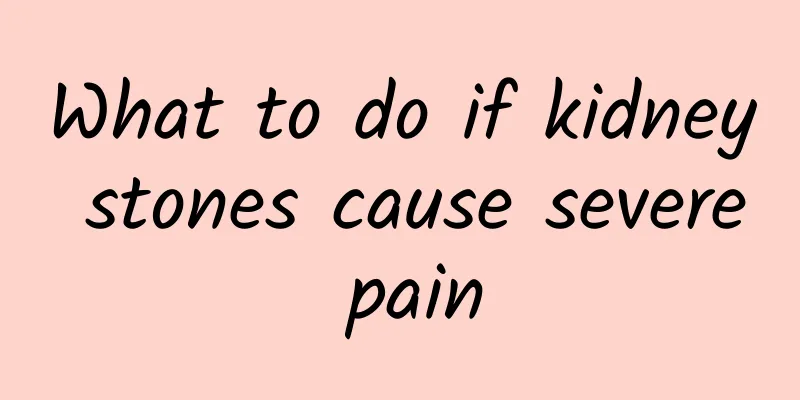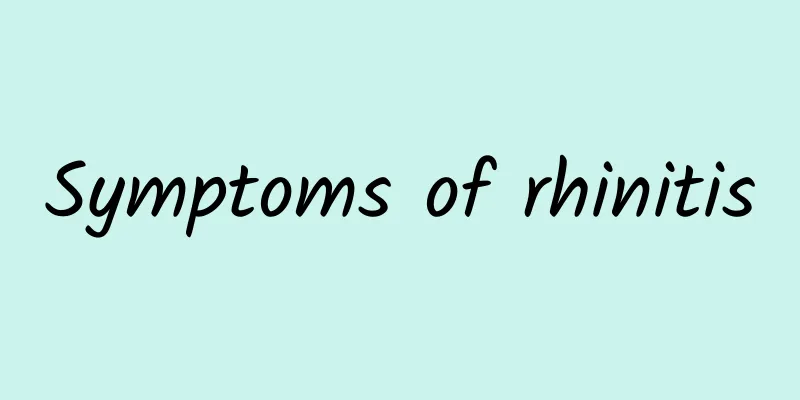What to do if kidney stones cause severe pain

|
Stones, also known as stone disease, are a very special disease that can occur in multiple parts of the body, such as the kidneys, urinary tract, gallbladder, etc. Kidney stones are a relatively common type of disease. Their biggest characteristic is pain. Large stones cause more intense pain, and sometimes the pain is so persistent that it is unbearable for patients. In fact, some good methods are very effective in relieving kidney stones. So, what should you do if kidney stones cause severe pain? The main symptoms of kidney stones are pain: most patients with kidney stones experience back pain or abdominal pain. Larger stones in the body of patients with kidney stones can compress, rub or cause water accumulation in the renal pelvis or calyx, which often causes dull or dull pain in the lower back on the affected side, often aggravated after activity; smaller stones in the body of patients with kidney stones can move and stimulate the renal pelvis or ureter, causing smooth muscle spasms and colic. This colic often occurs suddenly, and the pain in patients with kidney stones is severe, like a knife cutting, radiating along the affected ureter to the lower abdomen, vulva and inner thigh. Sometimes patients with kidney stones experience pale complexion, cold sweats, nausea, and vomiting. In severe cases, they may also experience symptoms such as weak and rapid pulse and low blood pressure. The pain often occurs in paroxysms, or may suddenly stop or ease due to a certain movement, leaving behind dull pain in the waist and abdomen. The only way to relieve this pain is to cure the kidney stones. If kidney stones are not cured, they will recur. Timely use of the Nei Jin Litholysis Formula can achieve the effect of relieving pain first and then expelling stones. At the same time, you should pay attention to your diet and drink plenty of water. Proper exercise, 1: Use the thumb of your right hand to press the painful points on the patient's back, which can relieve kidney stones through meridian conduction. Acupressure therapy has an immediate analgesic effect on renal colic and can also promote the excretion of stones. 2: Using hot compress can also relieve the symptoms of pain. Apply a hot towel to the painful area. However, be careful not to burn the skin when applying hot compress. 3: If the pain in the kidney area is severe, can you take antispasmodics and analgesics orally? Antispasmodics and analgesics include: atropine, progesterone, verapamil, etc.; anti-inflammatory drugs include: amoxicillin, cefuroxime, etc. 4: The patient should rest in bed and drink plenty of water to help with stone excretion. Kidney stones cause great pain to patients, so it is important to understand how to relieve the pain. At the same time, patients with kidney stones should pay attention to their daily living and eating habits. What to do when kidney stones cause pain? Kidney stones are a common disease occurring in the urinary tract. The cause of primary stones is unknown, while secondary stones are often caused by metabolic abnormalities, endocrine disorders and chronic pyelonephritis. Stones and infection are often causally related to each other. Pain is the most important symptom of kidney stones. Forty to fifty percent of patients have a history of pain. The pain is common in the waist and abdomen, but some patients do not have any symptoms. Now experts from the China Stone Disease Prevention and Control Center will introduce to you what you should do when kidney stone pain occurs. First, when you feel pain, lie prone on the bed, and ask your family to press the painful points on your back with their right thumb. This will treat urinary stones through meridian conduction. Acupressure therapy has an immediate effect on renal colic and can also promote stone excretion. If the pain is very severe, you need to take some smooth muscle antispasmodics, but these analgesics are often not effective alone and need to be used in combination with analgesics, preferably under the guidance of a doctor. Regarding the treatment of kidney stones, experts from the China Stone Disease Prevention and Control Center remind patients that patients who are suitable for surgery generally have stones that are too large (over 2 cm), and they should undergo surgery or lithotripsy first and then take medicine to remove the stones. Experts suggest that if the stones are less than 2 cm, the use of medication can achieve the ideal effect, but before using the medication, you must take symptomatic medication based on your physical condition. According to the center's many years of clinical experience, whether it is surgery or lithotripsy, if medication is not carried out in time after surgery or lithotripsy, more than 95% of the stones will recur, just the length of time is different. The reason is that surgery or lithotripsy can only treat the symptoms but not the root cause, and cannot eliminate the pathogenic factors. It is because of this potential cause of the disease that many patients do not take it seriously, not knowing that the treatment of recurrent stones will be more troublesome. |
>>: What to do if you can't urinate due to kidney stones
Recommend
Erosive gastritis
There are many common types of diseases, and diff...
Neck, shoulder, waist and leg pain has been with you for decades, white wine can solve it twice
Mugwort is also called: Artemisia argyi, moxibust...
Chronic infantile hypoxia
Everyone knows about hypoxia. Hypoxia means lack ...
Treatment methods for gout in the elderly, old Chinese medicine teaches you some dietary therapy
When people reach a certain age, they often exper...
How many grams of Poria cocos is used?
Fuling is also known as Bai Fuling and Fuling. Th...
How to make moxa sticks yourself and pictures
Moxibustion patch is the raw material of moxibust...
Best treatment for stroke
In today's society, although the social secur...
Cervical spondylosis rehabilitation exercises keep you away from cervical spondylosis
Cervical spondylosis has always been a common dis...
Symptoms of hand, foot and mouth disease in children
There are many common diseases among children. Wh...
Atrial Fibrillation Chinese Medicine
Atrial fibrillation is also called atrial fibrill...
What to do if your child has bad breath due to indigestion
For young children, their intestinal development ...
Suitable temperature and humidity for human body
It is not that people are very comfortable stayin...
How to treat subarachnoid hemorrhage effectively
Patients with subarachnoid hemorrhage must pay at...
How to eliminate synovitis effusion
Synovitis can cause fluid accumulation slowly, le...
Why do I get a rash when I sweat and get blown by the wind?
If you don't pay attention to keeping warm on...









